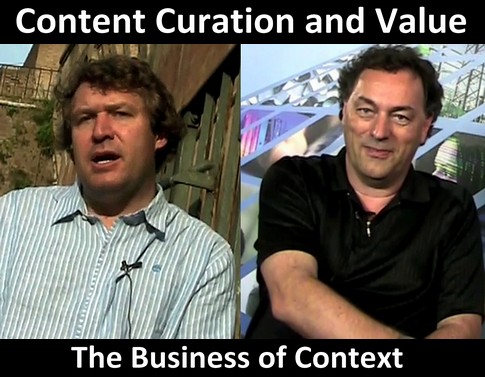 Photo credit: Robin Good
In these two short video interviews I captured a year back, George Siemens and Gerd Leonhard, discuss and analyze on what is defining itself as the new "business of context" and about the true value of niche, theme, curated content, with one question in mind: can the content curation strategy approach generate true business value that can be monetized?
Here are some of the highlights:
Photo credit: Robin Good
In these two short video interviews I captured a year back, George Siemens and Gerd Leonhard, discuss and analyze on what is defining itself as the new "business of context" and about the true value of niche, theme, curated content, with one question in mind: can the content curation strategy approach generate true business value that can be monetized?
Here are some of the highlights:
- People are willing to pay for value, for curated selections of meaningful content that not everyone has the skill or time to gather, filter and group in specific niches of interest.
- If the content and information has been produced by the public purse, it needs to be shared with the public.
- The part of content that you share for free is what builds up your reputation and credibility in front of the rest of the world.
- People will buy your content and compensate your efforts, only if the content you have already shared for free is valuable enough to drive them into a purchase.
- Context is increasingly becoming content. All additional elements like tags, metadata, geolocalization data that define the context of a piece of content are now part of the content themselves, because they make the content more usable.
- The economy on the web has become a "link-economy", where the context is as valuable as the content carried out by the link itself. A link shared on Facebook is more important than a link shared on your blog.
The Importance of Curated and Free Content - George Siemens
Duration: 4' 17''Full English Text Transcription
George Siemens: Could I be starting to serve as an emphasis point, that would help an organization like a corporation then gain value and make money from my commentary and the insights I provide? Yeah, I could do that. I could monetize that if I wanted to. I am sure it would reduce my readership enormously. Right now, if I look at the newsletter that I send out - I have with the newsletters on elearnspace and Connectivism - I probably have just under 8,000 subscribers to newsletters. If I was to say: "Look, I want a hundred dollars a year", I am pretty sure I would be losing 98% of those subscribers. Question is: "Do I think that the monetary value, that 2% of that subscriber is worth it?" Perhaps, would they then begin to share that content with others, because it is I have filtered, what I have selected as being important? I do not know. It is a little early to tell, but part of us also get tied on personality too. If you go out as Robin Good, as a personality, and you start to say: "I am going to customize", or "I am going to contextualize certain resources and make those available", I would suspect there would be people who are willing to say: "Giving Robin's depth of expertise in this field I am willing to pay for focused input and focused guidance by just selecting resources in this field." I am sure someone like Stephen Downes who is not interested in charging - he does not seem like it, at the start he did mentioned the future he may or may not do things with OLDaily from monetary perspective. Right at the start, he had that on his site. He since removed that - but with someone like Stephen Downes, I am quite comfortable to say: "Look, a hundred dollars a year if you want to read OLDaily" I would suspect there would be quite a few people that would say: "For what he does on a daily basis, I am willing to pay for that value." Now, again, he works for the government, through NRC, and so as a result he does not have that economic motivation. Just because some give content away for free, like their commentary and their selections, it certainly does not mean that everyone should give it away for free. But my argument has been for years that if the content and information has been produced by the public purse, it needs to be shared with the public, which is why I think all university content should be available online, because the government pays your university salary. It is ludicrous that you can then take what the public paid you to make and then generate that into something to make money for yourself. It just make no sense to me. When I am in the university setting, my work should be available to the public because the public is paying me. If I am in a corporate setting, that is a different situation altogether, because now you are part of a different economic structure and often when people talk about open content and open resources, they do not make that distinction between those two different worlds. I would say almost anyone, even in a corporate / consulting world, would find it to be very prudent to share at least a reasonable part of their content without fee, because that is what is going to give them the reputation. That is what is going to give them... maybe it is a consulting opportunity, maybe it is a conference speaking invitation, or whatever. Value economically can be measured in different ways. It is not just that "I sell my content and that is where it stops". Maybe I give away my content but now I am asked to consult for IBM because somebody at IBM read my resources and the found my input valuable and they want to connect with me personally. Content is a tricky value point, sometimes the value point just shifts further down the perspective. Even for example Madonna at one point talking about not charging for her music. Instead she was going to make a company purchase her music rights, so that they could make her give away the songs for free, but make money on the live performance. The economic system as a whole, I think, retains its integrity, but the value point on content shifts more from just the information itself to the value added that comes from a live performance, from personal commentary, from personal consulting opportunities.
The Relevance of Context in Content Curation - Gerd Leonhard
Duration: 1' 52''Gerd Leonhard: Content is not only what we create as professionals in edit, upload and get paid for. Content is being created everywhere in the world and in someways you can now argue that the context is becoming content also. For example, context meaning what they call meta-content, people actually adding a keyword to it, grading, tagging and putting stuff around, so we can actually find it and then we can also make sense of it - what has been referred to as metadata in the past. If these things are not actually there, then the content becomes unusable. For me, to select what I want to see, is really always a question of context. What time of the day it is? What kind of means of access do I have? How big is the screen? And so on. Context is becoming at least equally as crucial as content itself. You can see that in music right now. The most popular way of sharing is no longer by downloading anything, but is by sharing links. It is a whole link-economy. The link-economy basically says that the value of the context is at least as much as what is on the other side of the link. This is a very interesting development that we are going to see explode for example in the basic fact that the social networks like Facebook are essentially becoming broadcasters, because they have this huge network of people. All they need is permission to use the content, and they can be the next BBC. But their content is based on the context which is the people connecting to each other. I think in that situation, we are going to see in the next few years this growth of stuff that is going to put more value on the context and the content in some sort of combined way, rather than saying we have these tools of copyright for this song and therefore we made her. That is going to be an unsustainable position.
Video clips originally recorded by Robin Good for MasterNewMedia, and first published on December, 1st 2010 as "Content Curation And Value: The Business Of Context".
About George Siemens
 From late 2009, George Siemens holds a position at the the Technology Enhanced Knowledge Research Institute in Athabasca University. He was former Associate Director in the Learning Technologies Centre at the University of Manitoba. George blogs at www.elearnspace.org where he shares his vision on the educational landscape and the impact that media technologies have on the educational system. George Siemens is also the author of Connectivism: A Learning Theory for the Digital Age and the book "Knowing Knowledge" where he developes a learning theory called connectivism which uses a network as the central metaphor for learning and focuses on knowledge as a way to making connections.
From late 2009, George Siemens holds a position at the the Technology Enhanced Knowledge Research Institute in Athabasca University. He was former Associate Director in the Learning Technologies Centre at the University of Manitoba. George blogs at www.elearnspace.org where he shares his vision on the educational landscape and the impact that media technologies have on the educational system. George Siemens is also the author of Connectivism: A Learning Theory for the Digital Age and the book "Knowing Knowledge" where he developes a learning theory called connectivism which uses a network as the central metaphor for learning and focuses on knowledge as a way to making connections.
About Gerd Leonhard
 Gerd Leonhard is a media futurist as well as an author and writer, a media and Internet entrepreneur, a strategic advisor, and a keynote speaker & presenter. If you want to get a good feel for what he does, you can check out Gerd's blog MediaFuturist or visit his Youtube channel.
Gerd Leonhard is a media futurist as well as an author and writer, a media and Internet entrepreneur, a strategic advisor, and a keynote speaker & presenter. If you want to get a good feel for what he does, you can check out Gerd's blog MediaFuturist or visit his Youtube channel.
